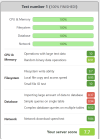Dear Peter, dear Support Team, the mysqltuner is currently outputting the following:
[--] Skipped version check for MySQLTuner script
[OK] Currently running supported MySQL version 10.3.36-MariaDB-0+deb10u2
[OK] Operating on 64-bit architecture
-------- Log file Recommendations ------------------------------------------------------------------
[OK] Log file /var/log/mysql/error.log exists
[--] Log file: /var/log/mysql/error.log (5K)
[OK] Log file /var/log/mysql/error.log is not empty
[OK] Log file /var/log/mysql/error.log is smaller than 32 Mb
[OK] Log file /var/log/mysql/error.log is readable.
[!!] /var/log/mysql/error.log contains 1 warning(s).
[!!] /var/log/mysql/error.log contains 1 error(s).
[--] 2 start(s) detected in /var/log/mysql/error.log
[--] 1) 2023-02-14 8:51:34 0 [Note] /usr/sbin/mysqld: ready for connections.
[--] 2) 2023-02-14 8:46:20 0 [Note] /usr/sbin/mysqld: ready for connections.
[--] 2 shutdown(s) detected in /var/log/mysql/error.log
[--] 1) 2023-02-14 8:51:33 0 [Note] /usr/sbin/mysqld: Shutdown complete
[--] 2) 2023-02-14 8:46:20 0 [Note] /usr/sbin/mysqld: Shutdown complete
-------- Storage Engine Statistics -----------------------------------------------------------------
[--] Status: +Aria +CSV +InnoDB +MEMORY +MRG_MyISAM +MyISAM +PERFORMANCE_SCHEMA +SEQUENCE
[--] Data in MyISAM tables: 13.6K (Tables: 2)
[--] Data in InnoDB tables: 509.8M (Tables: 1266)
[OK] Total fragmented tables: 0
-------- Analysis Performance Metrics --------------------------------------------------------------
[--] innodb_stats_on_metadata: OFF
[OK] No stat updates during querying INFORMATION_SCHEMA.
-------- Views Metrics -----------------------------------------------------------------------------
-------- Triggers Metrics --------------------------------------------------------------------------
-------- Routines Metrics --------------------------------------------------------------------------
-------- Security Recommendations ------------------------------------------------------------------
[OK] There are no anonymous accounts for any database users
[OK] All database users have passwords assigned
[--] There are 618 basic passwords in the list.
-------- CVE Security Recommendations --------------------------------------------------------------
[OK] NO SECURITY CVE FOUND FOR YOUR VERSION
-------- Performance Metrics -----------------------------------------------------------------------
[--] Up for: 20s (2K q [106.750 qps], 52 conn, TX: 23M, RX: 480K)
[--] Reads / Writes: 98% / 2%
[--] Binary logging is disabled
[--] Physical Memory : 62.9G
[--] Max MySQL memory : 27.8G
[--] Other process memory: 0B
[--] Total buffers: 24.8G global + 19.0M per thread (151 max threads)
[--] Performance_schema Max memory usage: 104M
[--] Galera GCache Max memory usage: 0B
[OK] Maximum reached memory usage: 25.0G (39.81% of installed RAM)
[OK] Maximum possible memory usage: 27.8G (44.13% of installed RAM)
[OK] Overall possible memory usage with other process is compatible with memory available
[OK] Slow queries: 0% (0/2K)
[OK] Highest usage of available connections: 3% (5/151)
[OK] Aborted connections: 0.00% (0/52)
[OK] Query cache is disabled by default due to mutex contention on multiprocessor machines.
[OK] Sorts requiring temporary tables: 0% (0 temp sorts / 262 sorts)
[OK] No joins without indexes
[OK] Temporary tables created on disk: 15% (25 on disk / 160 total)
[OK] Thread cache hit rate: 90% (5 created / 52 connections)
[OK] Table cache hit rate: 96% (2K hits / 2K requests)
[OK] table_definition_cache (1429) is greater than number of tables (1429)
[OK] Open file limit used: 0% (59/32K)
[OK] Table locks acquired immediately: 100% (46 immediate / 46 locks)
-------- Performance schema ------------------------------------------------------------------------
[--] Performance_schema is activated.
[--] Memory used by Performance_schema: 104.0M
[--] Sys schema is not installed.
-------- ThreadPool Metrics ------------------------------------------------------------------------
[--] ThreadPool stat is disabled.
-------- MyISAM Metrics ----------------------------------------------------------------------------
[!!] Key buffer used: 18.7% (4.5M used / 24.0M cache)
[OK] Key buffer size / total MyISAM indexes: 24.0M/133.0K
-------- InnoDB Metrics ----------------------------------------------------------------------------
[--] InnoDB is enabled.
[--] InnoDB Thread Concurrency: 0
[OK] InnoDB File per table is activated
[OK] InnoDB buffer pool / data size: 24.0G / 509.8M
[OK] Ratio InnoDB log file size / InnoDB Buffer pool size: 3.0G * 2/24.0G should be equal to 25%
[OK] InnoDB buffer pool instances: 24
[--] Number of InnoDB Buffer Pool Chunk: 192 for 24 Buffer Pool Instance(s)
[OK] Innodb_buffer_pool_size aligned with Innodb_buffer_pool_chunk_size & Innodb_buffer_pool_instances
[!!] InnoDB Read buffer efficiency: 73.98% (90391 hits / 122188 total)
[OK] InnoDB Write log efficiency: 94.58% (663 hits / 701 total)
[OK] InnoDB log waits: 0.00% (0 waits / 38 writes)
-------- Aria Metrics ------------------------------------------------------------------------------
[--] Aria Storage Engine is enabled.
[OK] Aria pagecache size / total Aria indexes: 128.0M/0B
[!!] Aria pagecache hit rate: 92.1% (242 cached / 19 reads)
-------- TokuDB Metrics ----------------------------------------------------------------------------
[--] TokuDB is disabled.
-------- XtraDB Metrics ----------------------------------------------------------------------------
[--] XtraDB is disabled.
-------- Galera Metrics ----------------------------------------------------------------------------
[--] Galera is disabled.
-------- Replication Metrics -----------------------------------------------------------------------
[--] Galera Synchronous replication: NO
[--] No replication slave(s) for this server.
[--] Binlog format: MIXED
[--] XA support enabled: ON
[--] Semi synchronous replication Master: OFF
[--] Semi synchronous replication Slave: OFF
[--] This is a standalone server
-------- Recommendations ---------------------------------------------------------------------------
General recommendations:
Check warning line(s) in /var/log/mysql/error.log file
Check error line(s) in /var/log/mysql/error.log file
MySQL was started within the last 24 hours: recommendations may be inaccurate
Consider installing Sys schema from
https://github.com/FromDual/mariadb-sys for MariaDB
Variables to adjust:
key_buffer_size (~ 4M)
It is entered in /etc/mysql/my.cnf
#The MariaDB configuration file
#
# The MariaDB/MySQL tools read configuration files in the following order:
# 1. "/etc/mysql/mariadb.cnf" (this file) to set global defaults,
# 2. "/etc/mysql/conf.d/*.cnf" to set global options.
# 3. "/etc/mysql/mariadb.conf.d/*.cnf" to set MariaDB-only options.
# 4. "~/.my.cnf" to set user-specific options.
#
# If the same option is defined multiple times, the last one will apply.
#
# One can use all long options that the program supports.
# Run program with --help to get a list of available options and with
# --print-defaults to see which it would actually understand and use.
#
# This group is read both both by the client and the server
# use it for options that affect everything
#
[client-server]
# Import all .cnf files from configuration directory
!includedir /etc/mysql/conf.d/
!includedir /etc/mysql/mariadb.conf.d/
[mysqld]
sql_mode=ERROR_FOR_DIVISION_BY_ZERO,NO_AUTO_CREATE_USER,NO_ENGINE_SUBSTITUTION
bind-address = ::ffff:127.0.0.1
local-infile=0
innodb_buffer_pool_size=24G
innodb_stats_on_metadata=0
innodb_log_file_size=3G
innodb_log_buffer_size=512M
skip-name-resolve=1
performance_schema=on
query_cache_size=0
query_cache_type=0
query_cache_limit=0
tmp_table_size=200M
max_heap_table_size=200M
table_definition_cache=1429
How can I prevent these join aborts and remove the remaining errors?
Many thanks for the support.

